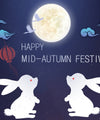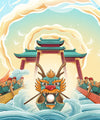Recent Post
Archive
- November 2024
Tags

The Dragon Boat Festival: A Traditional Chinese Festival
IrisW
May 26, 2025
0 comments
The Dragon Boat Festival, also known as Duanwu Festival, is one of the most important traditional festivals in China. It falls on the fifth day of the fifth lunar month, which usually occurs in late May or early June in the Gregorian calendar. This festival has a rich history and cultural significance, with various traditions and customs that have been passed down for thousands of years.
Origins and Legends
The exact origins of the Dragon Boat Festival are not entirely clear, but there are several popular legends and theories that attempt to explain its beginnings. One of the most well-known legends is related to the ancient Chinese poet Qu Yuan (340–278 BC). Qu Yuan was a loyal and patriotic minister of the State of Chu during the Warring States Period. He was known for his wisdom and dedication to his country, but he was also opposed by corrupt officials who slandered him to the king. Eventually, Qu Yuan was exiled from the state. When he learned that the State of Chu had been conquered by the State of Qin, he was overcome with grief and despair. In a final act of loyalty and protest, he threw himself into the Miluo River, clutching a large stone to ensure his drowning.
The local people, who admired Qu Yuan's integrity and were saddened by his death, rushed to the river in their boats to search for his body. They beat drums and splashed the water with their oars to scare away the fish and other aquatic creatures that might harm his body. They also threw zongzi (sticky rice dumplings) into the river to feed the fish, hoping that they would not eat Qu Yuan's remains. Over time, these actions evolved into the traditions of dragon boat racing and eating zongzi during the Dragon Boat Festival.
Another theory about the origins of the festival suggests that it was originally a summer solstice celebration or a ritual to ward off evil spirits and diseases. In ancient times, the fifth lunar month was considered an inauspicious time, as the weather was hot and humid, and diseases were more prevalent. People believed that evil spirits and poisonous creatures were more active during this time, so they performed various rituals to protect themselves and their families. These rituals included hanging aromatic plants such as mugwort and calamus, drinking realgar wine, and wearing sachets filled with medicinal herbs.
Traditions and Customs
Dragon Boat Racing
One of the most iconic and exciting traditions of the Dragon Boat Festival is dragon boat racing. Dragon boats are long, narrow boats decorated with dragon heads and tails. They are typically manned by a team of paddlers, usually between 20 and 30 people, who work together to paddle in sync. The 船头 (dragon head) is considered the most important part of the boat, as it is believed to bring good luck and ward off evil spirits.
Dragon boat races are held in many parts of China and other countries with significant Chinese populations, such as Singapore, Malaysia, and the United States. The races are not only a competitive sport but also a way to commemorate Qu Yuan and the ancient legend. The sound of drums and the cheers of the crowd create a lively and festive atmosphere. In recent years, dragon boat racing has also become an international sport, with the International Dragon Boat Federation organizing competitions around the world.
Eating Zongzi
Zongzi is a traditional food eaten during the Dragon Boat Festival. It is made of glutinous rice stuffed with various fillings, such as pork, beef, chicken, eggs, chestnuts, or red beans, and wrapped in bamboo or reed leaves. The shape of zongzi can vary, but the most common ones are triangular or tetrahedral.
The tradition of eating zongzi is closely associated with the legend of Qu Yuan. As mentioned earlier, people threw zongzi into the river to feed the fish and protect Qu Yuan's body. Over time, zongzi has become a symbol of the festival and a popular food throughout the year. There are many different varieties of zongzi, with regional differences in fillings and wrapping methods. For example, in southern China, zongzi are often filled with savory ingredients, while in northern China, sweet fillings such as red bean paste or jujube are more common.
Hanging Aromatic Plants
Hanging mugwort (ai ye) and calamus (chang pu) is another common custom during the Dragon Boat Festival. These plants are believed to have medicinal and protective properties. Mugwort has a strong aroma that is said to repel insects and ward off evil spirits, while calamus is thought to have antibacterial and anti-inflammatory effects.
People usually hang bundles of these plants on their doors and windows on the morning of the festival. The mugwort is often shaped like a sword, which is believed to cut through evil, while the calamus is shaped like a flag, which is said to drive away bad luck. In addition to their symbolic significance, these plants also have practical uses, as their aroma can help keep the house fresh and prevent the spread of diseases.
Wearing Sachets
Sachets, or xiang bao, are small cloth bags filled with a mixture of aromatic herbs, such as lavender, mint, cinnamon, and cloves. They are worn around the neck or carried in the pocket during the Dragon Boat Festival. The herbs in the sachets are believed to have a pleasant smell that can repel insects and protect the wearer from evil spirits and diseases.
Sachets come in various shapes and sizes, and they are often decorated with colorful patterns and embroidery. They are not only a traditional accessory but also a popular handicraft. In some regions, sachets are given as gifts to children, who believe that they can bring good luck and keep them healthy.
Drinking Realgar Wine
Realgar wine, or xiong huang jiu, is a type of alcoholic beverage made by adding realgar (a mineral containing arsenic sulfide) to rice wine. It is believed to have the power to drive away evil spirits and poisonous creatures, such as snakes, scorpions, centipedes, and spiders, which are collectively known as the "five poisonous creatures" in Chinese folklore.
In the past, people would drink a small amount of realgar wine and dab it on the foreheads of children to protect them from these creatures. However, due to the toxicity of realgar, this custom is less common today, and many people now use other methods, such as wearing sachets or using insect repellents, to protect themselves.
Cultural Significance
The Dragon Boat Festival is not only a time for celebrating traditions and customs but also a reflection of Chinese culture and values. The legend of Qu Yuan embodies the spirit of patriotism and loyalty, which are highly respected in Chinese society. Qu Yuan's love for his country and his willingness to sacrifice himself for its sake have made him a symbol of national pride and inspiration for generations.
The festival also emphasizes the importance of family and community. During the Dragon Boat Festival, families and friends often gather together to make zongzi, watch dragon boat races, and participate in other activities. This sense of togetherness and shared tradition helps to strengthen social bonds and preserve cultural heritage.
In addition, the Dragon Boat Festival is a celebration of nature and the changing seasons. The customs of hanging aromatic plants and wearing sachets reflect the ancient Chinese belief in the connection between humans and nature and the importance of using natural resources to protect health and well-being.
Modern-Day Celebrations
In modern times, the Dragon Boat Festival has evolved while still maintaining its core traditions. Dragon boat racing has become a popular sport and tourist attraction, with many cities hosting international races and festivals. Zongzi has also become a global food, with many supermarkets and restaurants around the world selling different varieties of this delicious dumpling.
At the same time, there is a growing awareness of the cultural and historical significance of the Dragon Boat Festival. In China, the festival is a public holiday, and efforts are being made to preserve and promote its traditions through education, cultural events, and media coverage. The United Nations Educational, Scientific, and Cultural Organization (UNESCO) has also recognized the Dragon Boat Festival as a part of the intangible cultural heritage of humanity, highlighting its importance on a global scale.
In conclusion, the Dragon Boat Festival is a vibrant and meaningful traditional festival that combines history, legend, and custom. It is a celebration of patriotism, family, and nature, and a testament to the rich cultural heritage of China. Whether through dragon boat racing, eating zongzi, or hanging aromatic plants, the traditions of the Dragon Boat Festival continue to bring people together and inspire a sense of pride and connection to the past. As the festival spreads to other parts of the world, it serves as a bridge between different cultures, promoting understanding and appreciation for the diversity of human traditions.
← Older Post Newer Post →


